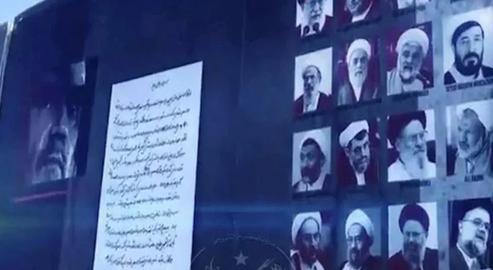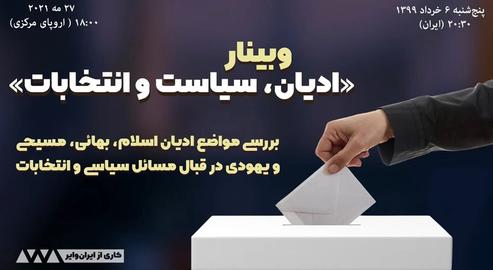Ebrahim Raisi, the leading presidential candidate and the current head of the Islamic Republic of Iran’s judiciary, is directly implicated in the extrajudicial killings of thousands of people in summer 1988. From an international legal perspective, he could easily stand accused of crimes against humanity.
If Raisi becomes the winner of the 2020-21 presidential election, would he also be a “wanted” head of state – and if so, what could happen?
**
Crimes against humanity include mass murder, torture and other acts of cruelty that diminish people’s status as human beings. Together with genocide and war crimes they are the most serious of all internationally-recognized crimes.
The killing of prisoners in Iran in the summer of 1988 is one such example. Ayatollah Khomeini ordered four people, including Ebrahim Raisi, to sit on the “death panel” that authorized the killing of opposition members who held onto their groups’ ideology behind bars. In August and September that year, thousands of political prisoners were executed after minutes-long trials, and then buried in unnamed mass graves.
Each member of the death panel went on to rise to senior government positions, Ebrahim Raisi most of all. But he is also suspected – if not convicted – of crimes against humanity, for which he could be arrested anywhere in the world, at any time. Hamid Nouri, a former prosecutor at Rajaei Shahr Prison, is now awaiting trial on the same charges in Sweden for his alleged part in the massacre.
In general, presidents, prime ministers, leaders, kings and queens, and other heads of state automatically enjoy political and diplomatic immunity, meaning it shouldn’t be possible to arrest them in a third country. But there are exceptions to this rule. If an international tribunal, such as the International Criminal Court in The Hague, determines that a person is suspected of a crime against humanity it can order their arrest by any government.
People charged with crimes against humanity can also be prosecuted in international courts, as in the case of the former Yugoslavian war crimes tribunal or the court hearing in Lebanon over Rafik Hariri’s assassination. No such court has been set up to deal with the crimes of the summer of 1988, though a “people’s tribunal” in The Hague without the power to enforce decisions has found against the perpetrators. The UN Security Council has the authority to order the establishment of such a tribunal, although it is subject to veto.
There is currently no international court summons against Raisi, and according to its statute the International Criminal Court cannot a verdict on crimes that took place before it was established. as the crimes took place in the summer of 1988 before the tribunal was convened, and according to its statute. The Islamic Republic has not joined this court to be able to prosecute a person like Raisi; but these are not the only options to implement the criminal justice in the case of summer 1988 executions.
Inside the Islamic Republic, the investigation into the 1988 massacre is still open. Meanwhile the state continues to persecute the families of victims and to destroy their mass graves, in effect extending the crime against humanity up to the present day. Attempts to eliminate the evidence of the crime only keep it fresh and current.
As recently as last year, a group of UN experts sent a letter to the government of the Islamic Republic last year asking the government to clarify the dimensions of its own case. The letter states that the massacre of the killings of 1988 “could” be a crime against humanity.
More recently more than 150 international human rights experts, including Mary Robinson, a former head of the UN high commissioner for human rights, and Mark Malloch, a former deputy secretary-general, have sent letters to the Iranian government and the UN Human Rights Council to call for an international inquiry into the atrocities.
The Islamic Republic’s ongoing attempts to cover up what happened, litigation by the victims' families, and revived international attention have since kept this case in the spotlight. Raisi’s presidential candidacy will doubtless do the same. He might not face arrest himself during trips to Western countries, but he will face a painful and uneasy presidency; there are political consequences for any European country that hosts Raisi and at the heart of any journey he takes will always be the matter of these crimes.
Hassan Rouhani, the current president of Iran, said during his 2017 electoral campaign that Raisi knew nothing but how to execute people. During Ahmadinejad’s tenure – as someone accused of both crimes and Holocaust denial – no European government would host him in bilateral meetings. It seems unlikely the situation will be much improved for Raisi. Indeed, meanwhile, his presidency may speed up attempts to gain justice for the horrors of 1988.
Related coverage:
Ebrahim Raisi: Leadership Hopeful's Key Role in Brutalizing Dissidents in the 2000s
Ebrahim Raisi: The 1990s Exploits of "Ayatollah Massacre"
Ebrahim Raisi: The Bloodstained Early Years
Ebrahim Raisi: The Hanging Judge Set to Become Iran's Next President
Faezeh Hashemi: This is Not an Election, It’s an Appointment
Letter to the Wife of Iran’s Chief Justice: Your Husband Killed My Husband
Ali Larijani Knocked Out of Iran's Presidential Race as Candidates Announced
Ebrahim Raisi’s Presidential Candidacy: A Gamble on Succeeding Khamenei
IranWire Exclusive: Chief Justice Using Fabricated Supporters in Presidential Bid
visit the accountability section
In this section of Iran Wire, you can contact the officials and launch your campaign for various problems


























comments